Effective Teamwork and Leadership for Organisational Behaviour
VerifiedAdded on 2023/06/10
|10
|2892
|229
Report
AI Summary
This report examines the impact of organisational behaviour, particularly focusing on the roles of teamwork and leadership, in achieving organisational success. It highlights how effective organisational behaviour is cultivated and managed within a company. The report discusses the significance of teams and leadership in creating an efficient and healthy working environment for employees. It explores Tuckman's team theory, detailing its stages (Forming, Storming, Norming, Performing, and Adjourning) and their impact on team dynamics and goal achievement. Furthermore, the report analyses various leadership theories, including Trait Theory, Behavioural Theory, Situational Theory, Contingency Theory, Transformational Leadership Theory, Great Man Theory, and Transactional Theory, emphasizing the importance of leadership in setting direction, motivating employees, and making informed decisions. The report underscores how these elements contribute to a positive and productive organisational culture, ultimately driving the company's overall performance and success. Desklib provides a platform for students to access this assignment solution along with numerous other solved assignments and past papers.
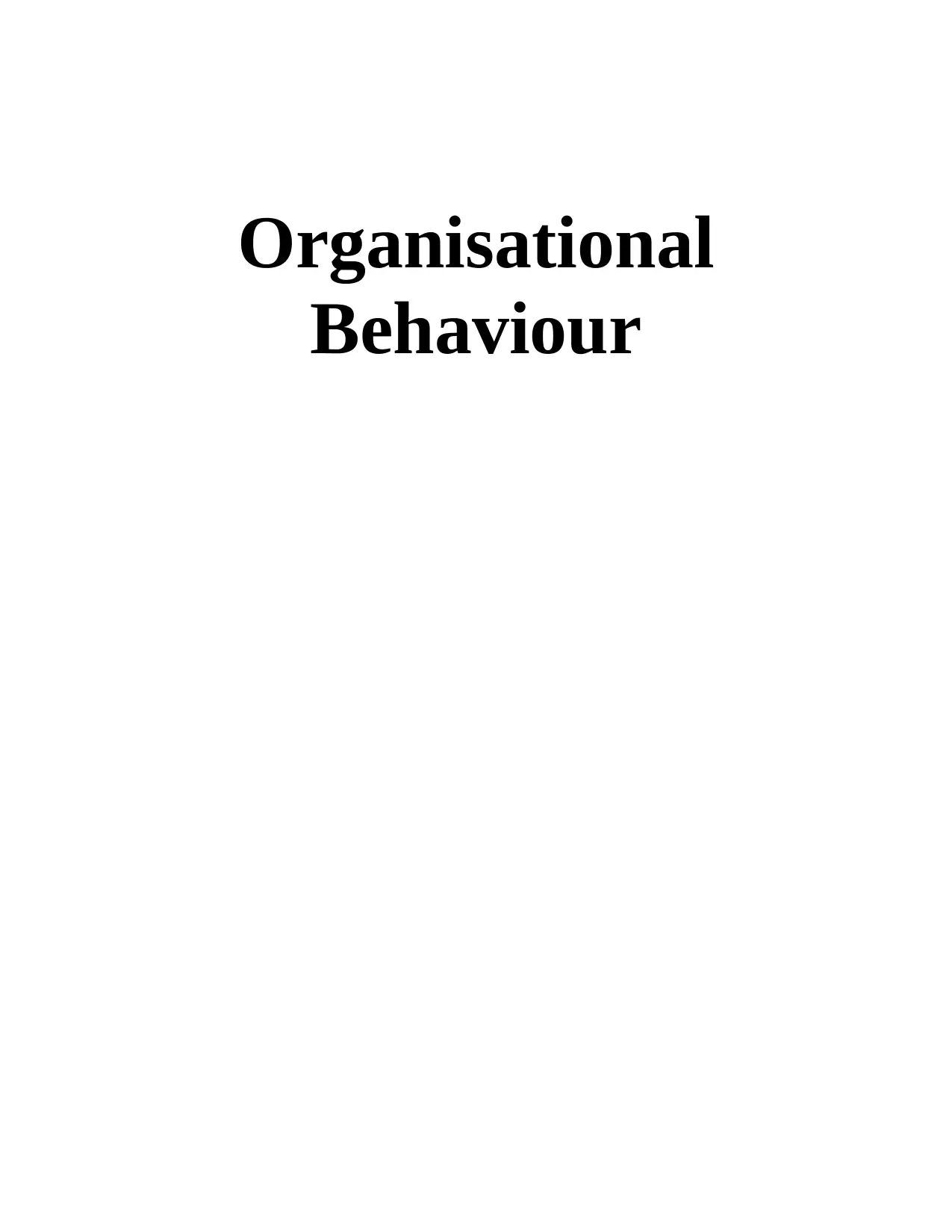
Organisational
Behaviour
Behaviour
Paraphrase This Document
Need a fresh take? Get an instant paraphrase of this document with our AI Paraphraser
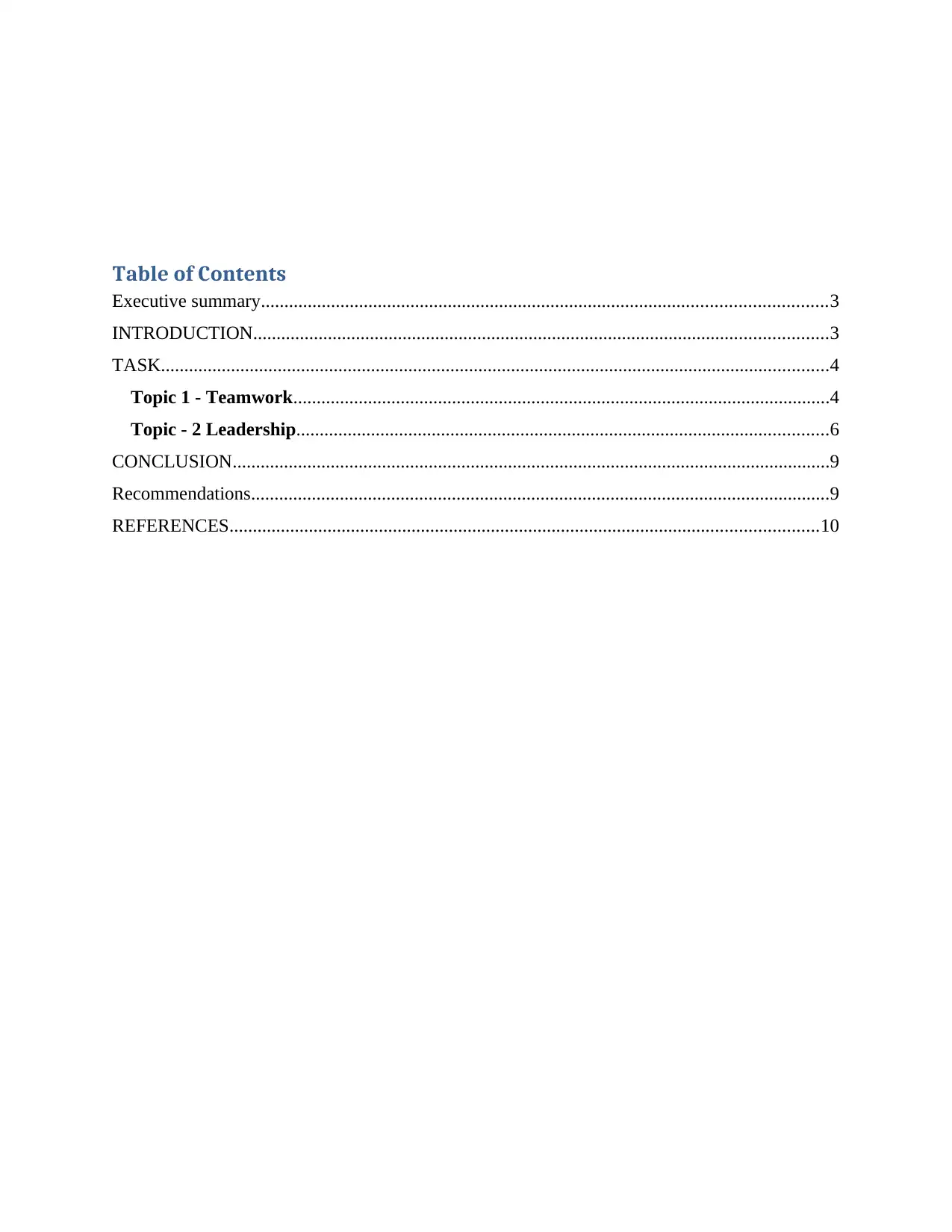
Table of Contents
Executive summary.........................................................................................................................3
INTRODUCTION...........................................................................................................................3
TASK...............................................................................................................................................4
Topic 1 - Teamwork...................................................................................................................4
Topic - 2 Leadership..................................................................................................................6
CONCLUSION................................................................................................................................9
Recommendations............................................................................................................................9
REFERENCES..............................................................................................................................10
Executive summary.........................................................................................................................3
INTRODUCTION...........................................................................................................................3
TASK...............................................................................................................................................4
Topic 1 - Teamwork...................................................................................................................4
Topic - 2 Leadership..................................................................................................................6
CONCLUSION................................................................................................................................9
Recommendations............................................................................................................................9
REFERENCES..............................................................................................................................10
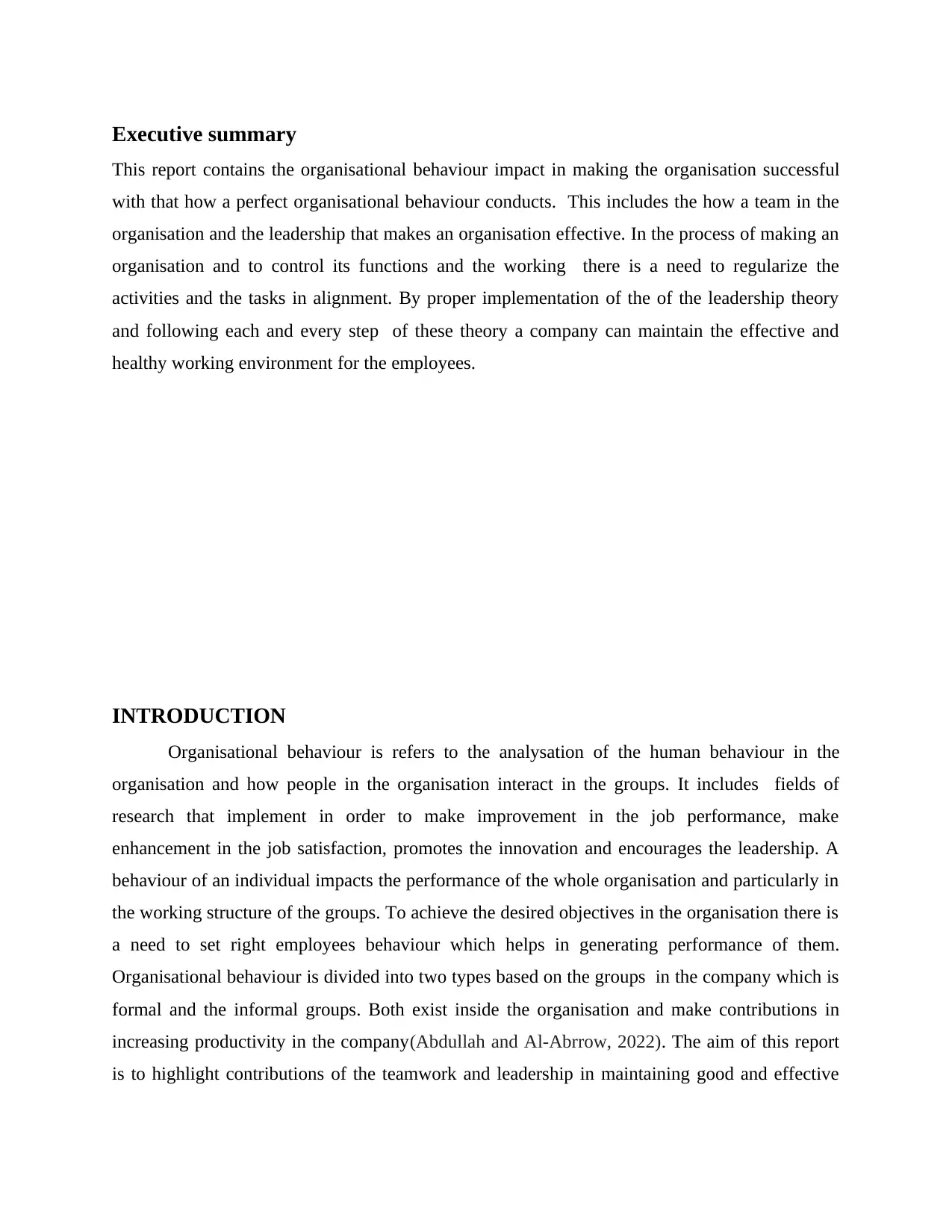
Executive summary
This report contains the organisational behaviour impact in making the organisation successful
with that how a perfect organisational behaviour conducts. This includes the how a team in the
organisation and the leadership that makes an organisation effective. In the process of making an
organisation and to control its functions and the working there is a need to regularize the
activities and the tasks in alignment. By proper implementation of the of the leadership theory
and following each and every step of these theory a company can maintain the effective and
healthy working environment for the employees.
INTRODUCTION
Organisational behaviour is refers to the analysation of the human behaviour in the
organisation and how people in the organisation interact in the groups. It includes fields of
research that implement in order to make improvement in the job performance, make
enhancement in the job satisfaction, promotes the innovation and encourages the leadership. A
behaviour of an individual impacts the performance of the whole organisation and particularly in
the working structure of the groups. To achieve the desired objectives in the organisation there is
a need to set right employees behaviour which helps in generating performance of them.
Organisational behaviour is divided into two types based on the groups in the company which is
formal and the informal groups. Both exist inside the organisation and make contributions in
increasing productivity in the company(Abdullah and Al-Abrrow, 2022). The aim of this report
is to highlight contributions of the teamwork and leadership in maintaining good and effective
This report contains the organisational behaviour impact in making the organisation successful
with that how a perfect organisational behaviour conducts. This includes the how a team in the
organisation and the leadership that makes an organisation effective. In the process of making an
organisation and to control its functions and the working there is a need to regularize the
activities and the tasks in alignment. By proper implementation of the of the leadership theory
and following each and every step of these theory a company can maintain the effective and
healthy working environment for the employees.
INTRODUCTION
Organisational behaviour is refers to the analysation of the human behaviour in the
organisation and how people in the organisation interact in the groups. It includes fields of
research that implement in order to make improvement in the job performance, make
enhancement in the job satisfaction, promotes the innovation and encourages the leadership. A
behaviour of an individual impacts the performance of the whole organisation and particularly in
the working structure of the groups. To achieve the desired objectives in the organisation there is
a need to set right employees behaviour which helps in generating performance of them.
Organisational behaviour is divided into two types based on the groups in the company which is
formal and the informal groups. Both exist inside the organisation and make contributions in
increasing productivity in the company(Abdullah and Al-Abrrow, 2022). The aim of this report
is to highlight contributions of the teamwork and leadership in maintaining good and effective
⊘ This is a preview!⊘
Do you want full access?
Subscribe today to unlock all pages.

Trusted by 1+ million students worldwide
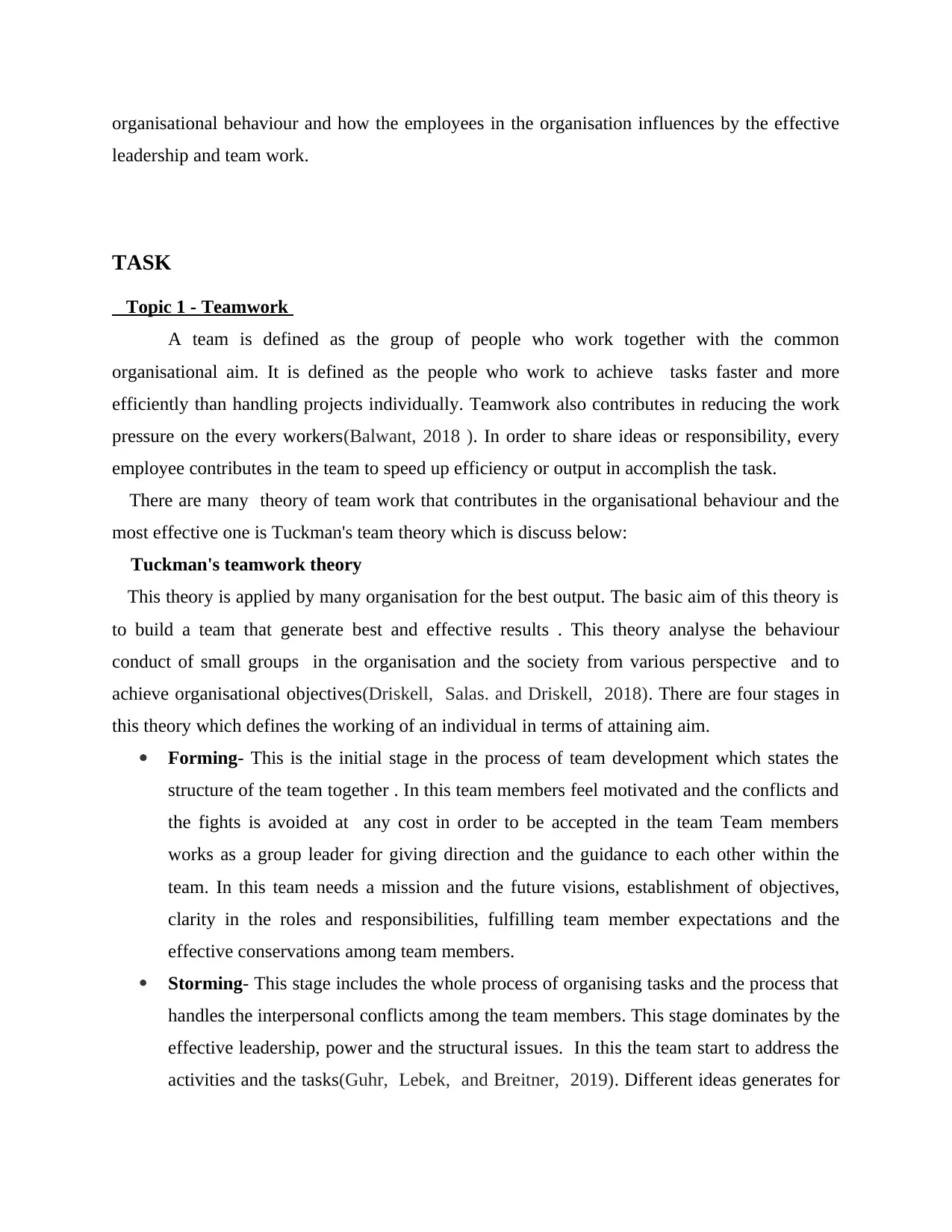
organisational behaviour and how the employees in the organisation influences by the effective
leadership and team work.
TASK
Topic 1 - Teamwork
A team is defined as the group of people who work together with the common
organisational aim. It is defined as the people who work to achieve tasks faster and more
efficiently than handling projects individually. Teamwork also contributes in reducing the work
pressure on the every workers(Balwant, 2018 ). In order to share ideas or responsibility, every
employee contributes in the team to speed up efficiency or output in accomplish the task.
There are many theory of team work that contributes in the organisational behaviour and the
most effective one is Tuckman's team theory which is discuss below:
Tuckman's teamwork theory
This theory is applied by many organisation for the best output. The basic aim of this theory is
to build a team that generate best and effective results . This theory analyse the behaviour
conduct of small groups in the organisation and the society from various perspective and to
achieve organisational objectives(Driskell, Salas. and Driskell, 2018). There are four stages in
this theory which defines the working of an individual in terms of attaining aim.
Forming- This is the initial stage in the process of team development which states the
structure of the team together . In this team members feel motivated and the conflicts and
the fights is avoided at any cost in order to be accepted in the team Team members
works as a group leader for giving direction and the guidance to each other within the
team. In this team needs a mission and the future visions, establishment of objectives,
clarity in the roles and responsibilities, fulfilling team member expectations and the
effective conservations among team members.
Storming- This stage includes the whole process of organising tasks and the process that
handles the interpersonal conflicts among the team members. This stage dominates by the
effective leadership, power and the structural issues. In this the team start to address the
activities and the tasks(Guhr, Lebek, and Breitner, 2019). Different ideas generates for
leadership and team work.
TASK
Topic 1 - Teamwork
A team is defined as the group of people who work together with the common
organisational aim. It is defined as the people who work to achieve tasks faster and more
efficiently than handling projects individually. Teamwork also contributes in reducing the work
pressure on the every workers(Balwant, 2018 ). In order to share ideas or responsibility, every
employee contributes in the team to speed up efficiency or output in accomplish the task.
There are many theory of team work that contributes in the organisational behaviour and the
most effective one is Tuckman's team theory which is discuss below:
Tuckman's teamwork theory
This theory is applied by many organisation for the best output. The basic aim of this theory is
to build a team that generate best and effective results . This theory analyse the behaviour
conduct of small groups in the organisation and the society from various perspective and to
achieve organisational objectives(Driskell, Salas. and Driskell, 2018). There are four stages in
this theory which defines the working of an individual in terms of attaining aim.
Forming- This is the initial stage in the process of team development which states the
structure of the team together . In this team members feel motivated and the conflicts and
the fights is avoided at any cost in order to be accepted in the team Team members
works as a group leader for giving direction and the guidance to each other within the
team. In this team needs a mission and the future visions, establishment of objectives,
clarity in the roles and responsibilities, fulfilling team member expectations and the
effective conservations among team members.
Storming- This stage includes the whole process of organising tasks and the process that
handles the interpersonal conflicts among the team members. This stage dominates by the
effective leadership, power and the structural issues. In this the team start to address the
activities and the tasks(Guhr, Lebek, and Breitner, 2019). Different ideas generates for
Paraphrase This Document
Need a fresh take? Get an instant paraphrase of this document with our AI Paraphraser
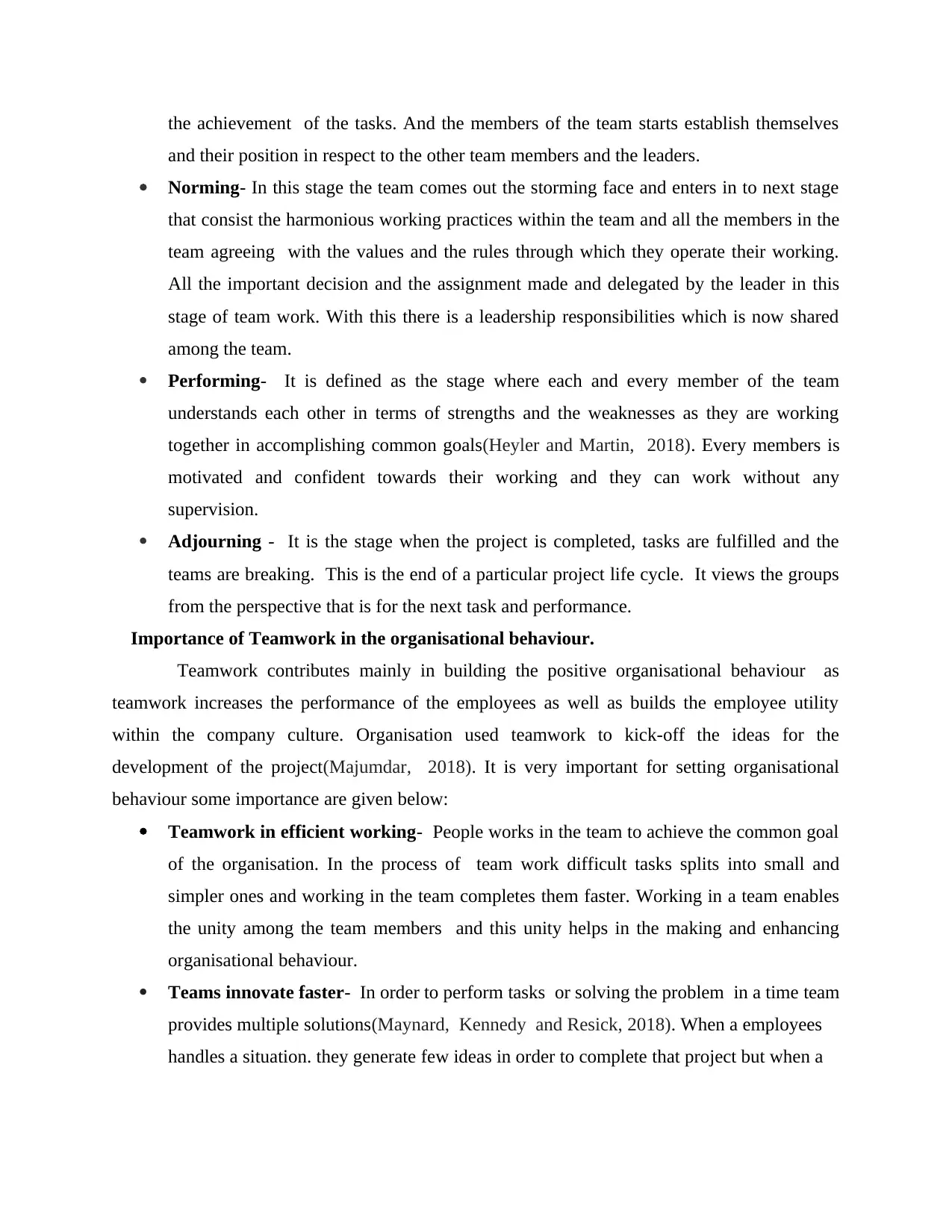
the achievement of the tasks. And the members of the team starts establish themselves
and their position in respect to the other team members and the leaders.
Norming- In this stage the team comes out the storming face and enters in to next stage
that consist the harmonious working practices within the team and all the members in the
team agreeing with the values and the rules through which they operate their working.
All the important decision and the assignment made and delegated by the leader in this
stage of team work. With this there is a leadership responsibilities which is now shared
among the team.
Performing- It is defined as the stage where each and every member of the team
understands each other in terms of strengths and the weaknesses as they are working
together in accomplishing common goals(Heyler and Martin, 2018). Every members is
motivated and confident towards their working and they can work without any
supervision.
Adjourning - It is the stage when the project is completed, tasks are fulfilled and the
teams are breaking. This is the end of a particular project life cycle. It views the groups
from the perspective that is for the next task and performance.
Importance of Teamwork in the organisational behaviour.
Teamwork contributes mainly in building the positive organisational behaviour as
teamwork increases the performance of the employees as well as builds the employee utility
within the company culture. Organisation used teamwork to kick-off the ideas for the
development of the project(Majumdar, 2018). It is very important for setting organisational
behaviour some importance are given below:
Teamwork in efficient working- People works in the team to achieve the common goal
of the organisation. In the process of team work difficult tasks splits into small and
simpler ones and working in the team completes them faster. Working in a team enables
the unity among the team members and this unity helps in the making and enhancing
organisational behaviour.
Teams innovate faster- In order to perform tasks or solving the problem in a time team
provides multiple solutions(Maynard, Kennedy and Resick, 2018). When a employees
handles a situation. they generate few ideas in order to complete that project but when a
and their position in respect to the other team members and the leaders.
Norming- In this stage the team comes out the storming face and enters in to next stage
that consist the harmonious working practices within the team and all the members in the
team agreeing with the values and the rules through which they operate their working.
All the important decision and the assignment made and delegated by the leader in this
stage of team work. With this there is a leadership responsibilities which is now shared
among the team.
Performing- It is defined as the stage where each and every member of the team
understands each other in terms of strengths and the weaknesses as they are working
together in accomplishing common goals(Heyler and Martin, 2018). Every members is
motivated and confident towards their working and they can work without any
supervision.
Adjourning - It is the stage when the project is completed, tasks are fulfilled and the
teams are breaking. This is the end of a particular project life cycle. It views the groups
from the perspective that is for the next task and performance.
Importance of Teamwork in the organisational behaviour.
Teamwork contributes mainly in building the positive organisational behaviour as
teamwork increases the performance of the employees as well as builds the employee utility
within the company culture. Organisation used teamwork to kick-off the ideas for the
development of the project(Majumdar, 2018). It is very important for setting organisational
behaviour some importance are given below:
Teamwork in efficient working- People works in the team to achieve the common goal
of the organisation. In the process of team work difficult tasks splits into small and
simpler ones and working in the team completes them faster. Working in a team enables
the unity among the team members and this unity helps in the making and enhancing
organisational behaviour.
Teams innovate faster- In order to perform tasks or solving the problem in a time team
provides multiple solutions(Maynard, Kennedy and Resick, 2018). When a employees
handles a situation. they generate few ideas in order to complete that project but when a
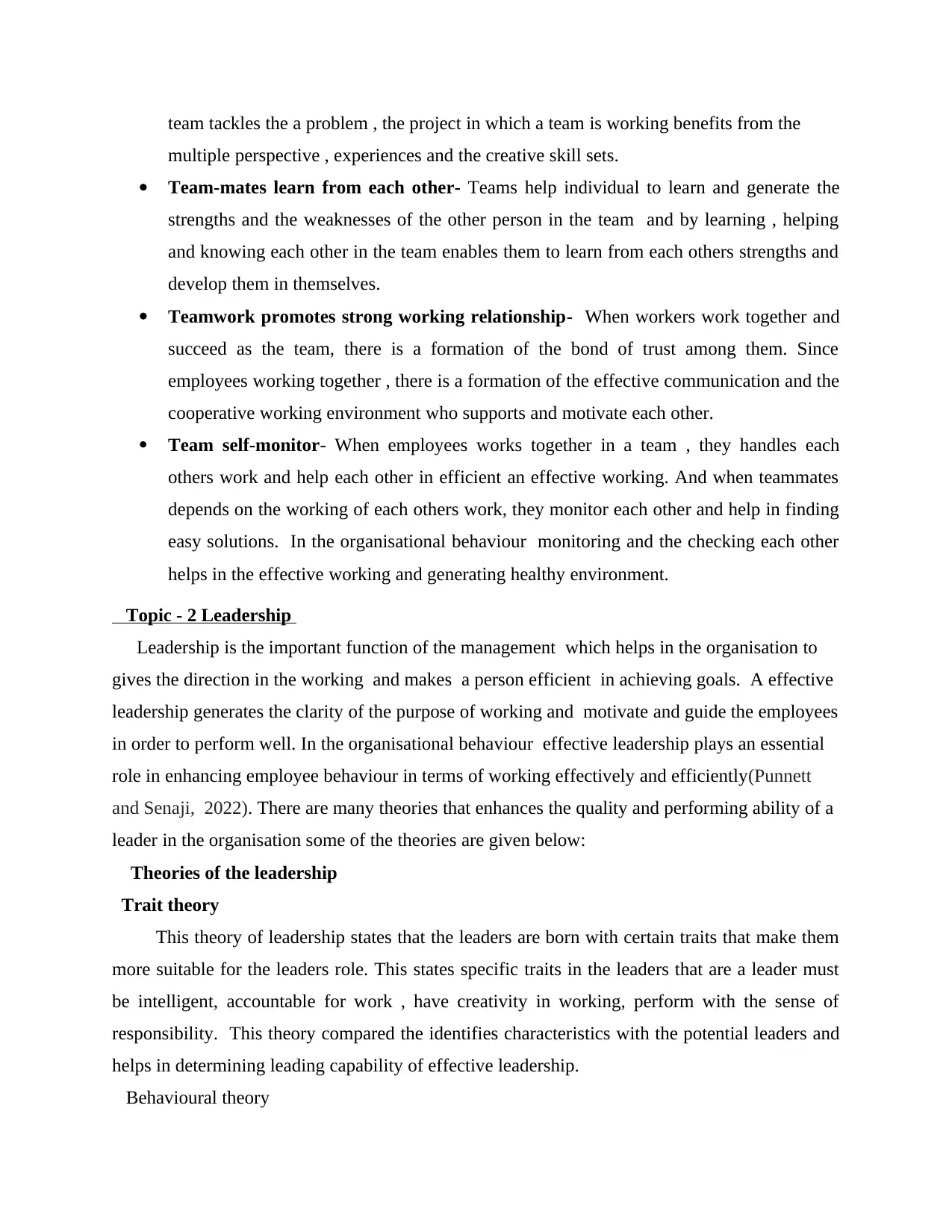
team tackles the a problem , the project in which a team is working benefits from the
multiple perspective , experiences and the creative skill sets.
Team-mates learn from each other- Teams help individual to learn and generate the
strengths and the weaknesses of the other person in the team and by learning , helping
and knowing each other in the team enables them to learn from each others strengths and
develop them in themselves.
Teamwork promotes strong working relationship- When workers work together and
succeed as the team, there is a formation of the bond of trust among them. Since
employees working together , there is a formation of the effective communication and the
cooperative working environment who supports and motivate each other.
Team self-monitor- When employees works together in a team , they handles each
others work and help each other in efficient an effective working. And when teammates
depends on the working of each others work, they monitor each other and help in finding
easy solutions. In the organisational behaviour monitoring and the checking each other
helps in the effective working and generating healthy environment.
Topic - 2 Leadership
Leadership is the important function of the management which helps in the organisation to
gives the direction in the working and makes a person efficient in achieving goals. A effective
leadership generates the clarity of the purpose of working and motivate and guide the employees
in order to perform well. In the organisational behaviour effective leadership plays an essential
role in enhancing employee behaviour in terms of working effectively and efficiently(Punnett
and Senaji, 2022). There are many theories that enhances the quality and performing ability of a
leader in the organisation some of the theories are given below:
Theories of the leadership
Trait theory
This theory of leadership states that the leaders are born with certain traits that make them
more suitable for the leaders role. This states specific traits in the leaders that are a leader must
be intelligent, accountable for work , have creativity in working, perform with the sense of
responsibility. This theory compared the identifies characteristics with the potential leaders and
helps in determining leading capability of effective leadership.
Behavioural theory
multiple perspective , experiences and the creative skill sets.
Team-mates learn from each other- Teams help individual to learn and generate the
strengths and the weaknesses of the other person in the team and by learning , helping
and knowing each other in the team enables them to learn from each others strengths and
develop them in themselves.
Teamwork promotes strong working relationship- When workers work together and
succeed as the team, there is a formation of the bond of trust among them. Since
employees working together , there is a formation of the effective communication and the
cooperative working environment who supports and motivate each other.
Team self-monitor- When employees works together in a team , they handles each
others work and help each other in efficient an effective working. And when teammates
depends on the working of each others work, they monitor each other and help in finding
easy solutions. In the organisational behaviour monitoring and the checking each other
helps in the effective working and generating healthy environment.
Topic - 2 Leadership
Leadership is the important function of the management which helps in the organisation to
gives the direction in the working and makes a person efficient in achieving goals. A effective
leadership generates the clarity of the purpose of working and motivate and guide the employees
in order to perform well. In the organisational behaviour effective leadership plays an essential
role in enhancing employee behaviour in terms of working effectively and efficiently(Punnett
and Senaji, 2022). There are many theories that enhances the quality and performing ability of a
leader in the organisation some of the theories are given below:
Theories of the leadership
Trait theory
This theory of leadership states that the leaders are born with certain traits that make them
more suitable for the leaders role. This states specific traits in the leaders that are a leader must
be intelligent, accountable for work , have creativity in working, perform with the sense of
responsibility. This theory compared the identifies characteristics with the potential leaders and
helps in determining leading capability of effective leadership.
Behavioural theory
⊘ This is a preview!⊘
Do you want full access?
Subscribe today to unlock all pages.

Trusted by 1+ million students worldwide
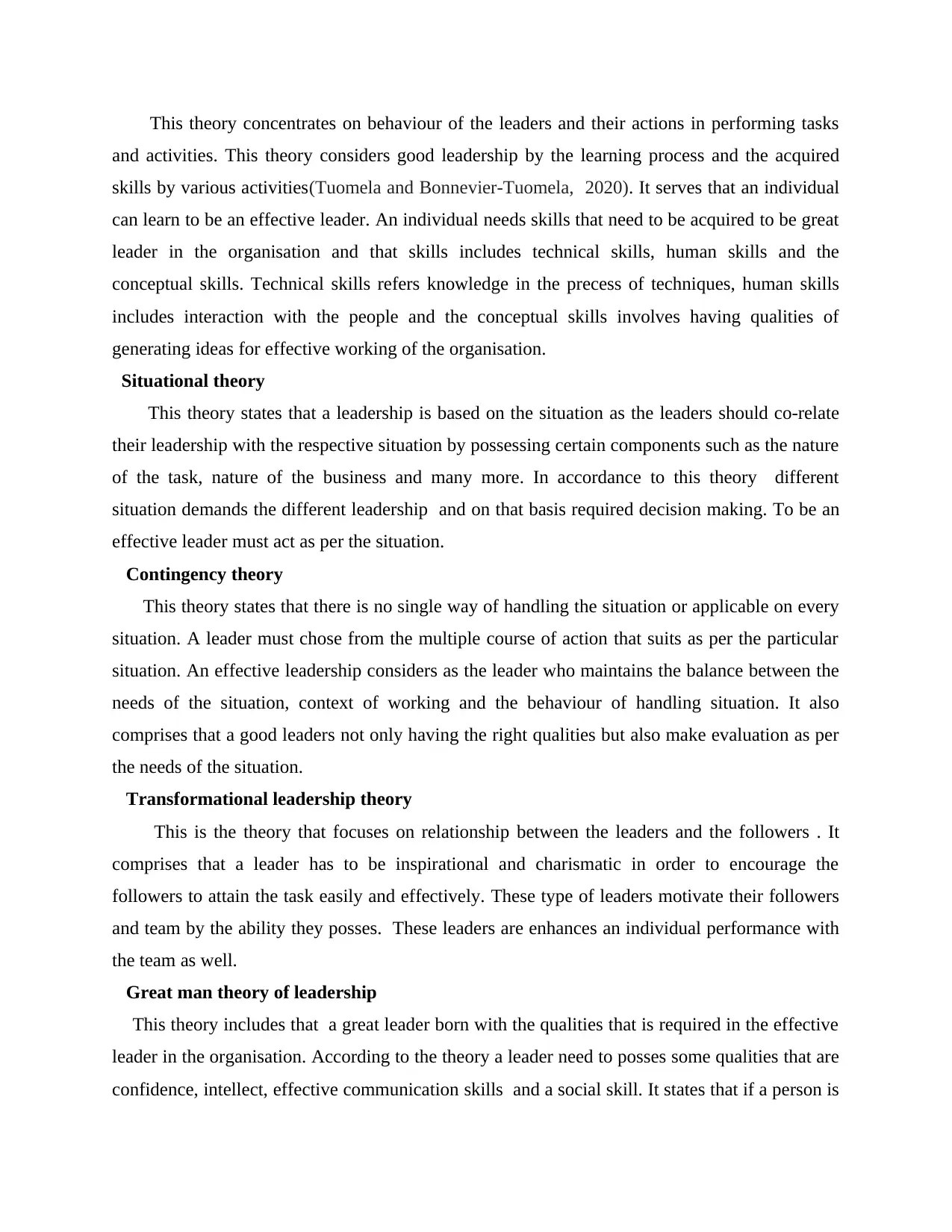
This theory concentrates on behaviour of the leaders and their actions in performing tasks
and activities. This theory considers good leadership by the learning process and the acquired
skills by various activities(Tuomela and Bonnevier-Tuomela, 2020). It serves that an individual
can learn to be an effective leader. An individual needs skills that need to be acquired to be great
leader in the organisation and that skills includes technical skills, human skills and the
conceptual skills. Technical skills refers knowledge in the precess of techniques, human skills
includes interaction with the people and the conceptual skills involves having qualities of
generating ideas for effective working of the organisation.
Situational theory
This theory states that a leadership is based on the situation as the leaders should co-relate
their leadership with the respective situation by possessing certain components such as the nature
of the task, nature of the business and many more. In accordance to this theory different
situation demands the different leadership and on that basis required decision making. To be an
effective leader must act as per the situation.
Contingency theory
This theory states that there is no single way of handling the situation or applicable on every
situation. A leader must chose from the multiple course of action that suits as per the particular
situation. An effective leadership considers as the leader who maintains the balance between the
needs of the situation, context of working and the behaviour of handling situation. It also
comprises that a good leaders not only having the right qualities but also make evaluation as per
the needs of the situation.
Transformational leadership theory
This is the theory that focuses on relationship between the leaders and the followers . It
comprises that a leader has to be inspirational and charismatic in order to encourage the
followers to attain the task easily and effectively. These type of leaders motivate their followers
and team by the ability they posses. These leaders are enhances an individual performance with
the team as well.
Great man theory of leadership
This theory includes that a great leader born with the qualities that is required in the effective
leader in the organisation. According to the theory a leader need to posses some qualities that are
confidence, intellect, effective communication skills and a social skill. It states that if a person is
and activities. This theory considers good leadership by the learning process and the acquired
skills by various activities(Tuomela and Bonnevier-Tuomela, 2020). It serves that an individual
can learn to be an effective leader. An individual needs skills that need to be acquired to be great
leader in the organisation and that skills includes technical skills, human skills and the
conceptual skills. Technical skills refers knowledge in the precess of techniques, human skills
includes interaction with the people and the conceptual skills involves having qualities of
generating ideas for effective working of the organisation.
Situational theory
This theory states that a leadership is based on the situation as the leaders should co-relate
their leadership with the respective situation by possessing certain components such as the nature
of the task, nature of the business and many more. In accordance to this theory different
situation demands the different leadership and on that basis required decision making. To be an
effective leader must act as per the situation.
Contingency theory
This theory states that there is no single way of handling the situation or applicable on every
situation. A leader must chose from the multiple course of action that suits as per the particular
situation. An effective leadership considers as the leader who maintains the balance between the
needs of the situation, context of working and the behaviour of handling situation. It also
comprises that a good leaders not only having the right qualities but also make evaluation as per
the needs of the situation.
Transformational leadership theory
This is the theory that focuses on relationship between the leaders and the followers . It
comprises that a leader has to be inspirational and charismatic in order to encourage the
followers to attain the task easily and effectively. These type of leaders motivate their followers
and team by the ability they posses. These leaders are enhances an individual performance with
the team as well.
Great man theory of leadership
This theory includes that a great leader born with the qualities that is required in the effective
leader in the organisation. According to the theory a leader need to posses some qualities that are
confidence, intellect, effective communication skills and a social skill. It states that if a person is
Paraphrase This Document
Need a fresh take? Get an instant paraphrase of this document with our AI Paraphraser
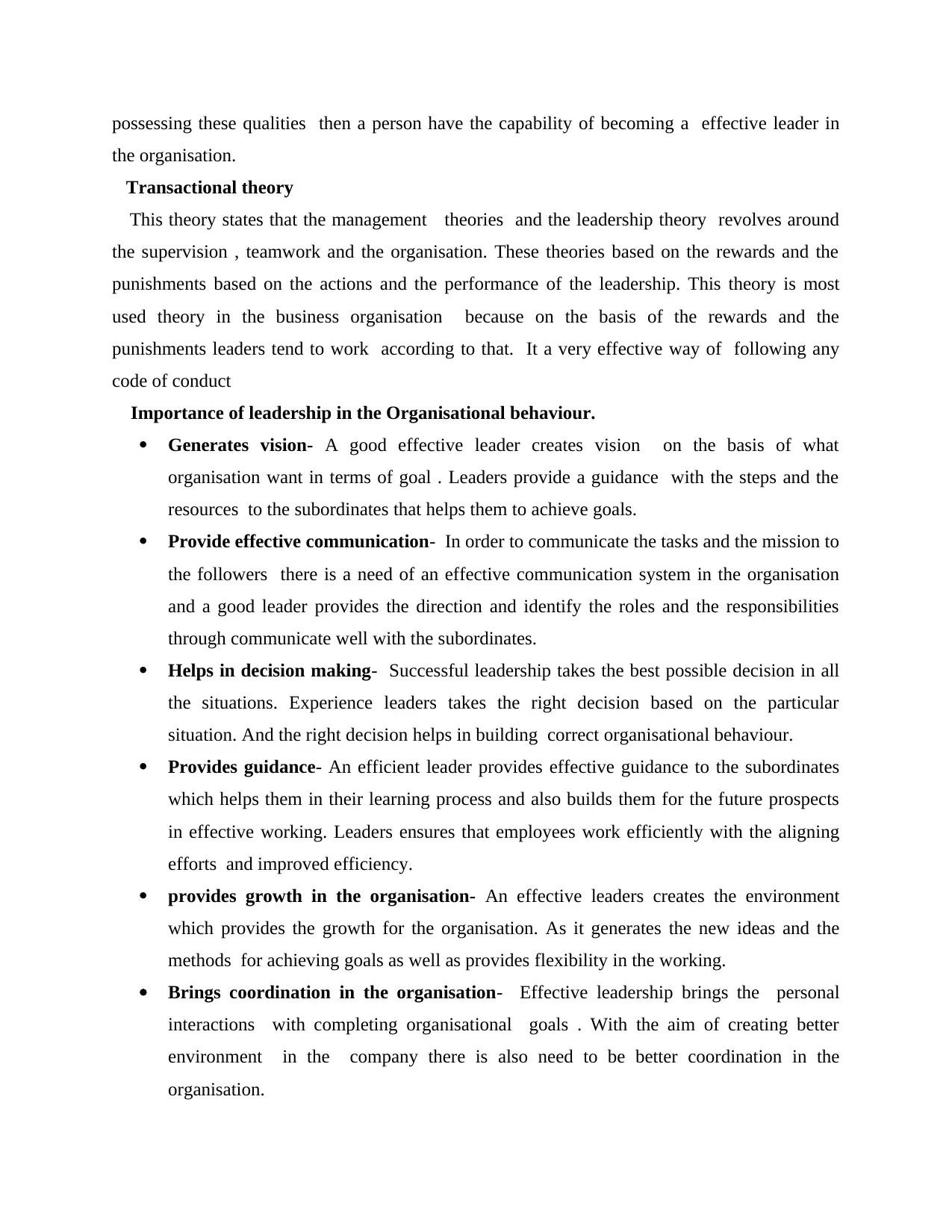
possessing these qualities then a person have the capability of becoming a effective leader in
the organisation.
Transactional theory
This theory states that the management theories and the leadership theory revolves around
the supervision , teamwork and the organisation. These theories based on the rewards and the
punishments based on the actions and the performance of the leadership. This theory is most
used theory in the business organisation because on the basis of the rewards and the
punishments leaders tend to work according to that. It a very effective way of following any
code of conduct
Importance of leadership in the Organisational behaviour.
Generates vision- A good effective leader creates vision on the basis of what
organisation want in terms of goal . Leaders provide a guidance with the steps and the
resources to the subordinates that helps them to achieve goals.
Provide effective communication- In order to communicate the tasks and the mission to
the followers there is a need of an effective communication system in the organisation
and a good leader provides the direction and identify the roles and the responsibilities
through communicate well with the subordinates.
Helps in decision making- Successful leadership takes the best possible decision in all
the situations. Experience leaders takes the right decision based on the particular
situation. And the right decision helps in building correct organisational behaviour.
Provides guidance- An efficient leader provides effective guidance to the subordinates
which helps them in their learning process and also builds them for the future prospects
in effective working. Leaders ensures that employees work efficiently with the aligning
efforts and improved efficiency.
provides growth in the organisation- An effective leaders creates the environment
which provides the growth for the organisation. As it generates the new ideas and the
methods for achieving goals as well as provides flexibility in the working.
Brings coordination in the organisation- Effective leadership brings the personal
interactions with completing organisational goals . With the aim of creating better
environment in the company there is also need to be better coordination in the
organisation.
the organisation.
Transactional theory
This theory states that the management theories and the leadership theory revolves around
the supervision , teamwork and the organisation. These theories based on the rewards and the
punishments based on the actions and the performance of the leadership. This theory is most
used theory in the business organisation because on the basis of the rewards and the
punishments leaders tend to work according to that. It a very effective way of following any
code of conduct
Importance of leadership in the Organisational behaviour.
Generates vision- A good effective leader creates vision on the basis of what
organisation want in terms of goal . Leaders provide a guidance with the steps and the
resources to the subordinates that helps them to achieve goals.
Provide effective communication- In order to communicate the tasks and the mission to
the followers there is a need of an effective communication system in the organisation
and a good leader provides the direction and identify the roles and the responsibilities
through communicate well with the subordinates.
Helps in decision making- Successful leadership takes the best possible decision in all
the situations. Experience leaders takes the right decision based on the particular
situation. And the right decision helps in building correct organisational behaviour.
Provides guidance- An efficient leader provides effective guidance to the subordinates
which helps them in their learning process and also builds them for the future prospects
in effective working. Leaders ensures that employees work efficiently with the aligning
efforts and improved efficiency.
provides growth in the organisation- An effective leaders creates the environment
which provides the growth for the organisation. As it generates the new ideas and the
methods for achieving goals as well as provides flexibility in the working.
Brings coordination in the organisation- Effective leadership brings the personal
interactions with completing organisational goals . With the aim of creating better
environment in the company there is also need to be better coordination in the
organisation.
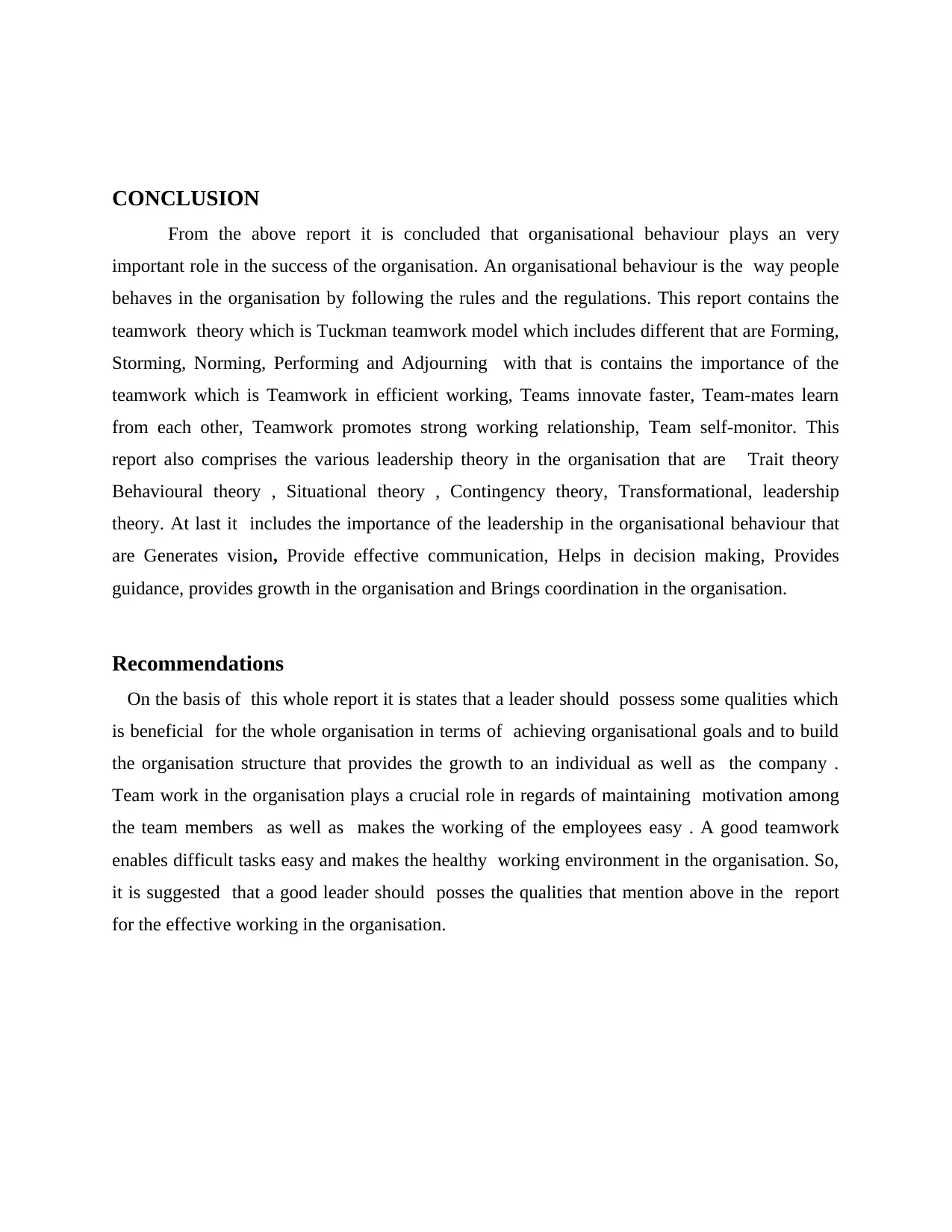
CONCLUSION
From the above report it is concluded that organisational behaviour plays an very
important role in the success of the organisation. An organisational behaviour is the way people
behaves in the organisation by following the rules and the regulations. This report contains the
teamwork theory which is Tuckman teamwork model which includes different that are Forming,
Storming, Norming, Performing and Adjourning with that is contains the importance of the
teamwork which is Teamwork in efficient working, Teams innovate faster, Team-mates learn
from each other, Teamwork promotes strong working relationship, Team self-monitor. This
report also comprises the various leadership theory in the organisation that are Trait theory
Behavioural theory , Situational theory , Contingency theory, Transformational, leadership
theory. At last it includes the importance of the leadership in the organisational behaviour that
are Generates vision, Provide effective communication, Helps in decision making, Provides
guidance, provides growth in the organisation and Brings coordination in the organisation.
Recommendations
On the basis of this whole report it is states that a leader should possess some qualities which
is beneficial for the whole organisation in terms of achieving organisational goals and to build
the organisation structure that provides the growth to an individual as well as the company .
Team work in the organisation plays a crucial role in regards of maintaining motivation among
the team members as well as makes the working of the employees easy . A good teamwork
enables difficult tasks easy and makes the healthy working environment in the organisation. So,
it is suggested that a good leader should posses the qualities that mention above in the report
for the effective working in the organisation.
From the above report it is concluded that organisational behaviour plays an very
important role in the success of the organisation. An organisational behaviour is the way people
behaves in the organisation by following the rules and the regulations. This report contains the
teamwork theory which is Tuckman teamwork model which includes different that are Forming,
Storming, Norming, Performing and Adjourning with that is contains the importance of the
teamwork which is Teamwork in efficient working, Teams innovate faster, Team-mates learn
from each other, Teamwork promotes strong working relationship, Team self-monitor. This
report also comprises the various leadership theory in the organisation that are Trait theory
Behavioural theory , Situational theory , Contingency theory, Transformational, leadership
theory. At last it includes the importance of the leadership in the organisational behaviour that
are Generates vision, Provide effective communication, Helps in decision making, Provides
guidance, provides growth in the organisation and Brings coordination in the organisation.
Recommendations
On the basis of this whole report it is states that a leader should possess some qualities which
is beneficial for the whole organisation in terms of achieving organisational goals and to build
the organisation structure that provides the growth to an individual as well as the company .
Team work in the organisation plays a crucial role in regards of maintaining motivation among
the team members as well as makes the working of the employees easy . A good teamwork
enables difficult tasks easy and makes the healthy working environment in the organisation. So,
it is suggested that a good leader should posses the qualities that mention above in the report
for the effective working in the organisation.
⊘ This is a preview!⊘
Do you want full access?
Subscribe today to unlock all pages.

Trusted by 1+ million students worldwide
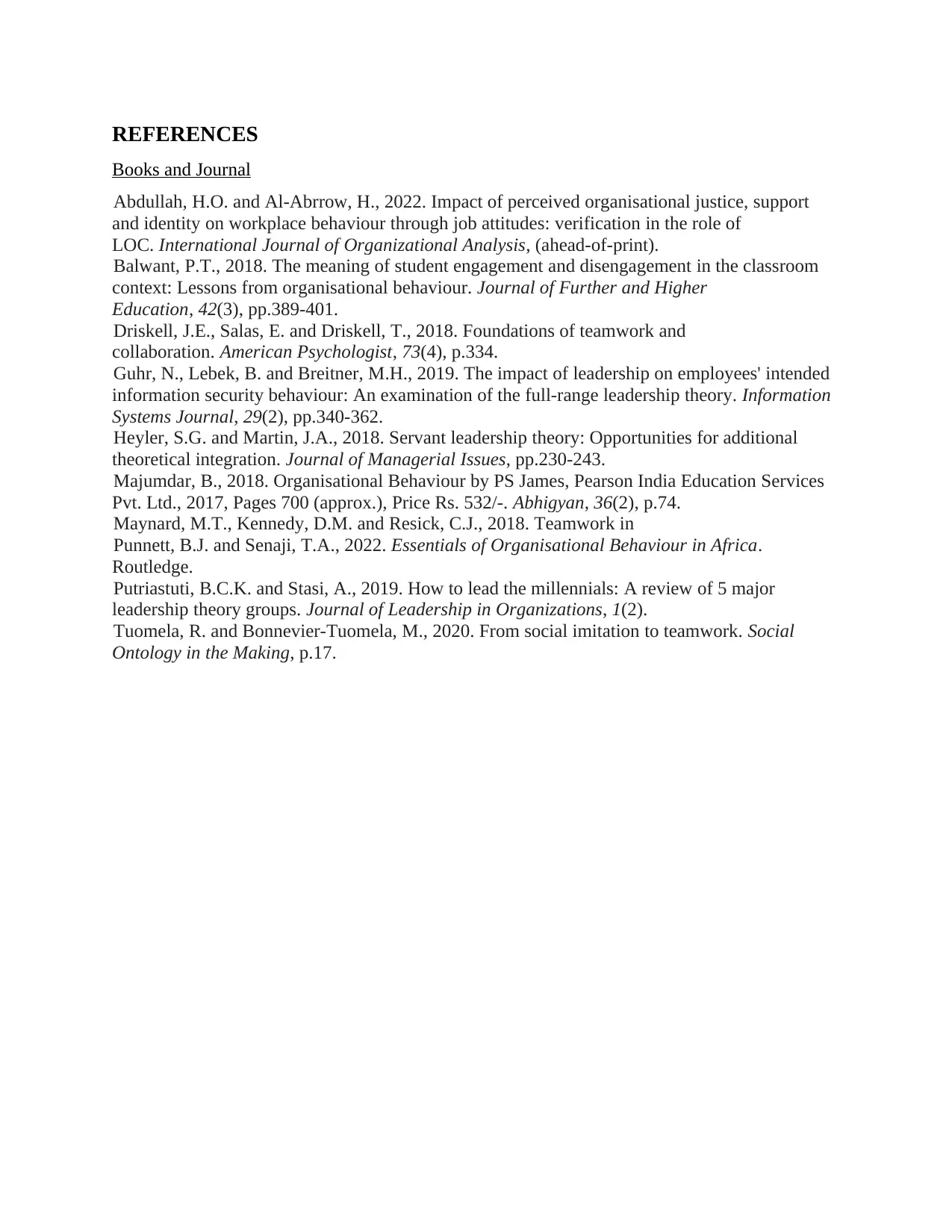
REFERENCES
Books and Journal
Abdullah, H.O. and Al-Abrrow, H., 2022. Impact of perceived organisational justice, support
and identity on workplace behaviour through job attitudes: verification in the role of
LOC. International Journal of Organizational Analysis, (ahead-of-print).
Balwant, P.T., 2018. The meaning of student engagement and disengagement in the classroom
context: Lessons from organisational behaviour. Journal of Further and Higher
Education, 42(3), pp.389-401.
Driskell, J.E., Salas, E. and Driskell, T., 2018. Foundations of teamwork and
collaboration. American Psychologist, 73(4), p.334.
Guhr, N., Lebek, B. and Breitner, M.H., 2019. The impact of leadership on employees' intended
information security behaviour: An examination of the full‐range leadership theory. Information
Systems Journal, 29(2), pp.340-362.
Heyler, S.G. and Martin, J.A., 2018. Servant leadership theory: Opportunities for additional
theoretical integration. Journal of Managerial Issues, pp.230-243.
Majumdar, B., 2018. Organisational Behaviour by PS James, Pearson India Education Services
Pvt. Ltd., 2017, Pages 700 (approx.), Price Rs. 532/-. Abhigyan, 36(2), p.74.
Maynard, M.T., Kennedy, D.M. and Resick, C.J., 2018. Teamwork in
Punnett, B.J. and Senaji, T.A., 2022. Essentials of Organisational Behaviour in Africa.
Routledge.
Putriastuti, B.C.K. and Stasi, A., 2019. How to lead the millennials: A review of 5 major
leadership theory groups. Journal of Leadership in Organizations, 1(2).
Tuomela, R. and Bonnevier-Tuomela, M., 2020. From social imitation to teamwork. Social
Ontology in the Making, p.17.
Books and Journal
Abdullah, H.O. and Al-Abrrow, H., 2022. Impact of perceived organisational justice, support
and identity on workplace behaviour through job attitudes: verification in the role of
LOC. International Journal of Organizational Analysis, (ahead-of-print).
Balwant, P.T., 2018. The meaning of student engagement and disengagement in the classroom
context: Lessons from organisational behaviour. Journal of Further and Higher
Education, 42(3), pp.389-401.
Driskell, J.E., Salas, E. and Driskell, T., 2018. Foundations of teamwork and
collaboration. American Psychologist, 73(4), p.334.
Guhr, N., Lebek, B. and Breitner, M.H., 2019. The impact of leadership on employees' intended
information security behaviour: An examination of the full‐range leadership theory. Information
Systems Journal, 29(2), pp.340-362.
Heyler, S.G. and Martin, J.A., 2018. Servant leadership theory: Opportunities for additional
theoretical integration. Journal of Managerial Issues, pp.230-243.
Majumdar, B., 2018. Organisational Behaviour by PS James, Pearson India Education Services
Pvt. Ltd., 2017, Pages 700 (approx.), Price Rs. 532/-. Abhigyan, 36(2), p.74.
Maynard, M.T., Kennedy, D.M. and Resick, C.J., 2018. Teamwork in
Punnett, B.J. and Senaji, T.A., 2022. Essentials of Organisational Behaviour in Africa.
Routledge.
Putriastuti, B.C.K. and Stasi, A., 2019. How to lead the millennials: A review of 5 major
leadership theory groups. Journal of Leadership in Organizations, 1(2).
Tuomela, R. and Bonnevier-Tuomela, M., 2020. From social imitation to teamwork. Social
Ontology in the Making, p.17.
1 out of 10
Related Documents
Your All-in-One AI-Powered Toolkit for Academic Success.
+13062052269
info@desklib.com
Available 24*7 on WhatsApp / Email
![[object Object]](/_next/static/media/star-bottom.7253800d.svg)
Unlock your academic potential
Copyright © 2020–2026 A2Z Services. All Rights Reserved. Developed and managed by ZUCOL.



